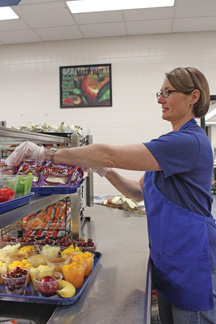
This semester, the school made changes to school lunches to make them more filling. The changes come by means of a revision to the Healthy, Hunger-Free Kids Act due to an appeal to the U.S. Department of Agriculture (USDA) by North Dakota Senator John Hoeven, who noticed that school lunches left many students hungry.
According to cafeteria manager Anne Marie Woerner, the most important change made was a lift on maximum limits for meats and grains. Under the new requirements, schools can offer any amount of meat and grain products in a standard lunch as long as they meet a certain minimum requirement.
Woerner said she believes making the changes was the right choice.
“It was silly they had (maximum restrictions on meat and grain products) in the first place,” Woerner said.
In response to the revision of federal school lunch policies, this school has made changes to its lunches this semester including the addition of new whole grain products like biscuits and breadsticks to existing lunch entrees.
Despite this increase in meal size, students like Jacob “Jake” Herr, football player and sophomore, said he still would like more food during lunch. He said he needed to eat more food than most people to perform well in football.
“I don’t think (the school lunches) give enough,” Herr said. “You can get more but you get charged extra.”
Nevertheless, Herr said he understands it would be difficult to change school lunches to specifically accommodate student athletes. However, he also said it would be helpful if some extra food items cost a little less.
“Extra entrees (should) be a little bit less (costly),” Herr said.
However, Elizabeth Flores, assistant director for Carmel Clay Schools Food Services, said these new changes to the school lunch policy are not permanent and may again change in upcoming months.
Flores said the USDA has not yet decided the final federal guidelines for lunch and are still experimenting with proportions.
Despite this uncertainty, Flores said this school is doing all it can given the situation.
“We are fighting for (the students’) best interest,” Flores said.

































![AI in films like "The Brutalist" is convenient, but shouldn’t take priority [opinion]](https://hilite.org/wp-content/uploads/2025/02/catherine-cover-1200x471.jpg)









































![Review: “The Immortal Soul Salvage Yard:” A criminally underrated poetry collection [MUSE]](https://hilite.org/wp-content/uploads/2025/03/71cju6TvqmL._AC_UF10001000_QL80_.jpg)
![Review: "Dog Man" is Unapologetically Chaotic [MUSE]](https://hilite.org/wp-content/uploads/2025/03/dogman-1200x700.jpg)
![Review: "Ne Zha 2": The WeChat family reunion I didn’t know I needed [MUSE]](https://hilite.org/wp-content/uploads/2025/03/unnamed-4.png)
![Review in Print: Maripaz Villar brings a delightfully unique style to the world of WEBTOON [MUSE]](https://hilite.org/wp-content/uploads/2023/12/maripazcover-1200x960.jpg)
![Review: “The Sword of Kaigen” is a masterpiece [MUSE]](https://hilite.org/wp-content/uploads/2023/11/Screenshot-2023-11-26-201051.png)
![Review: Gateron Oil Kings, great linear switches, okay price [MUSE]](https://hilite.org/wp-content/uploads/2023/11/Screenshot-2023-11-26-200553.png)
![Review: “A Haunting in Venice” is a significant improvement from other Agatha Christie adaptations [MUSE]](https://hilite.org/wp-content/uploads/2023/11/e7ee2938a6d422669771bce6d8088521.jpg)
![Review: A Thanksgiving story from elementary school, still just as interesting [MUSE]](https://hilite.org/wp-content/uploads/2023/11/Screenshot-2023-11-26-195514-987x1200.png)
![Review: "When I Fly Towards You", cute, uplifting youth drama [MUSE]](https://hilite.org/wp-content/uploads/2023/09/When-I-Fly-Towards-You-Chinese-drama.png)
![Postcards from Muse: Hawaii Travel Diary [MUSE]](https://hilite.org/wp-content/uploads/2023/09/My-project-1-1200x1200.jpg)
![Review: "Ladybug & Cat Noir: The Movie," departure from original show [MUSE]](https://hilite.org/wp-content/uploads/2023/09/Ladybug__Cat_Noir_-_The_Movie_poster.jpg)
![Review in Print: "Hidden Love" is the cute, uplifting drama everyone needs [MUSE]](https://hilite.org/wp-content/uploads/2023/09/hiddenlovecover-e1693597208225-1030x1200.png)
![Review in Print: "Heartstopper" is the heartwarming queer romance we all need [MUSE]](https://hilite.org/wp-content/uploads/2023/08/museheartstoppercover-1200x654.png)




